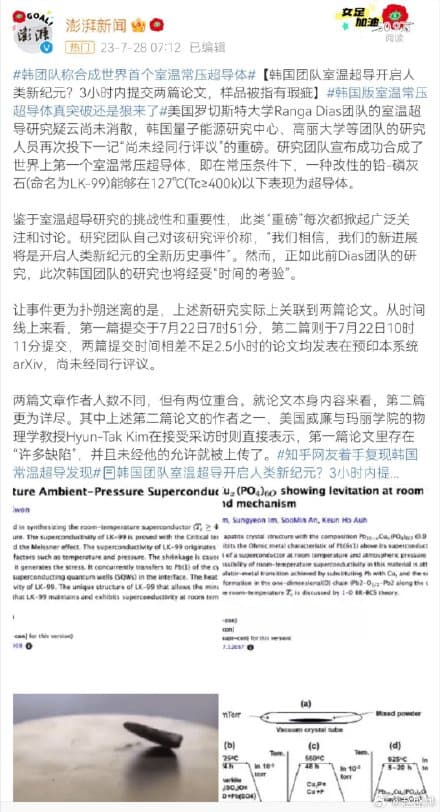Korean superconductivity
In recent news, a bombshell has been dropped by researchers from the Quantum Energy Research Centre (Q-centre) at Korea University and other teams who have announced that they have successfully synthesised the world's first room-temperature atmospheric-pressure superconductor. This breakthrough discovery involves a modified lead-apatite, named LK-99, which exhibits zero resistance by applying a current to LK-99 below 127°C, with the voltage being essentially zero for a certain range of currents. If this claim is true, it would represent a significant step forward in superconductivity technology and could potentially revolutionize various industries such as power generation, transportation, and communication.

28 July 2023
The reaction on Chinese social media platform Weibo has been mixed, with some netizens expressing skepticism about the discovery and others expressing excitement at the potential implications of this breakthrough. The news has quickly risen to the top of the hot list on Zhihu, a popular question-and-answer website in China, with over 30.71 million views as of 15:00 on July 27th.
Some professionals in the field have expressed concerns about the credibility of the research, calling the results "so good that it seems to be fake." Others have questioned the academic standard of the paper and the team's methodology, further fueling skepticism about the discovery.
On the other hand, many netizens are hopeful and excited about the possibility of this breakthrough, expressing a desire for it to be true. They believe that if LK-99 is proven to be a genuine room-temperature superconductor, it could accelerate technological development by hundreds of years. Some have even joked about the Nobel Prize being renamed after the Korean researchers, reflecting the potential significance of this discovery.
Moreover, the announcement has sparked discussions on possible implications for different countries and industries. If room-temperature superconductivity becomes a reality, it could eliminate the need for nuclear fusion and change the course of space exploration. It might also solve various problems plaguing humanity, such as power generation, transportation, and communication, effectively revolutionizing our world.
In conclusion, while there is skepticism about the Korean team's discovery, the potential implications if it turns out to be true are enormous and could change the course of history. The world eagerly awaits further validation from the scientific community as researchers around the globe begin reproduction experiments. This development has indeed become a significant topic of interest globally and its impact on various fields will be closely watched and studied in the coming days and weeks.
Share this article
Related Articles
Falcons Edge XG 3‑2 in TI14 Finals, Leaving Chinese Star Ame a Three‑Time Runner‑Up
By Trending on Weibo
Sports
15 Sept 2025

Xi Jinping Elevates Cybersecurity to Core National‑Security Pillar, Driving China’s Quest for a Cyber Superpower
By Trending on Weibo
News & Politics
15 Sept 2025

Ruby Lin Says She and Wallace Huo Are Still “Adjusting” After Seven Years, Igniting Viral Debate on Celebrity Marriages
By Trending on Weibo
Entertainment
15 Sept 2025

Luo Yonghao vs. Xibei: Celebrity Entrepreneur Sparks Media Storm Over Pre‑Made Dishes and Calls for Transparency
By Trending on Weibo
News & Politics
15 Sept 2025

Alipay Users Rush to Revoke Permissions Over Hidden Authorizations, Sparking Nationwide Privacy Debate
By Trending on Weibo
Tech
15 Sept 2025